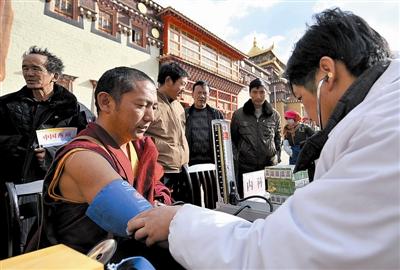Religious Tibetans get pensions and medicare
Religious practitioners in Tibet can now pay into a social insurance plan. Having come into effect at the start of the year, the plan says monks and nuns over 18 year old, if they want to, can pay for social insurance which covers medical care and pensions.
 |
|
Religious practitioners in Tibet can now pay into a social insurance plan. |
Taken care by the law brings a stronger sense of security for these elders. Qiangjiu is one of the beneficiaries.
The 68 year old monk has long been practicing in Sera Monastery, one of the three most famous Tibetan Buddhist Monasteries in Lhasa. Though he enjoys good health in general, he's very happy not to have to worry about getting sick as he gets older.
Qiangjiu, a monk in Sera Monastery, said, "I can go and see the doctor for free with this. It's great. We're very happy."
According to the regulation, each religious practitioner is charged 280 yuan per month - 220 yuan of this is paid by the local government.
|
|
|
Religious practitioners in Tibet can now pay into a social insurance plan. |
Regarding pensions, women over 60 and men over 65 can get 120 yuan per month. A week ago, Qiangjiu received his pension for the first 3 months of this year.
Qiangjiu, a monk in Sera Monastery, said, "I have a pension now. I don't have to worry about my elderly life."
Huangbin, vice director of Municipal Social Security Dept., Lhasa, said, “Religious practitioners over 60 enjoy the same level of social insurance as urban dwellers. And all of them had obtained medical insurance by the end of last year."
Tibetan government officials say that all religious practitioners are included in the social insurance system. This means the elderly will not have to rely on apprentices in their later years.


